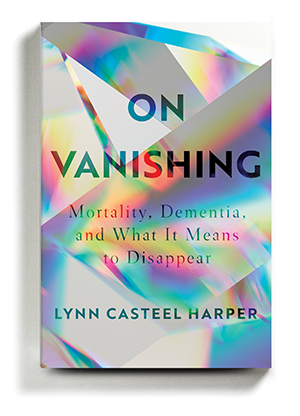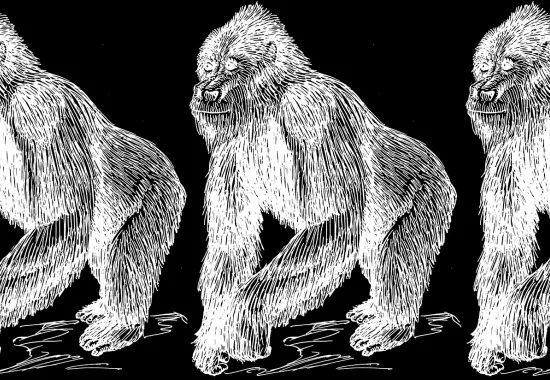A Kind of Ascendency: Reconciling with My Grandfather through Lynn Casteel Harper’s "On Vanishing"
All the blinds were shut in the entrance hall, but the room was filled with light. Bright bulbs illuminated a large space with burgundy carpet and dated furniture. I was visiting my grandfather, who had recently been placed in a memory care facility. This was a special day for me. Although I’d visited Grandpa at the facility before, this was the first time my family and I had brought along my partner.
•
 That day was constantly on my mind while reading Lynn Casteel Harper’s On Vanishing: Mortality, Dementia, and What It Means to Disappear, a book that fully delivers on the sweeping promises of its title. Through her experience as a chaplain and minister in the dementia unit of a nursing home, Harper teaches her readers a new way to approach our collective thinking about aging, memory, and the definition of human worth. These concepts apply to those living with dementia and those who will live with it, including our future selves.
That day was constantly on my mind while reading Lynn Casteel Harper’s On Vanishing: Mortality, Dementia, and What It Means to Disappear, a book that fully delivers on the sweeping promises of its title. Through her experience as a chaplain and minister in the dementia unit of a nursing home, Harper teaches her readers a new way to approach our collective thinking about aging, memory, and the definition of human worth. These concepts apply to those living with dementia and those who will live with it, including our future selves.
On Vanishing is a book that lingers in the mind for weeks. One reason for this is Harper’s striking language. The prose is dynamic and a joy to follow: “Imagine if we received all lives—those with and without dementia—as conglomerations of the ordinary and the peculiar, the fragmented and the whole, the present and the vanishing.” Along with the fluid nature of its writing, On Vanishing’s subject matter requires readers to dig deep and engage with their self-perceptions, sense of worth, and with the loved ones they hold dear.
Harper resists easy answers to difficult questions. And yet, On Vanishing is delightfully optimistic. I approached the book with no small amount of skepticism, but in the end I was utterly convinced. Harper challenges readers to see people with dementia not as fading but as evolving, a peeling back of facades. Revealing parts of themselves that were always present, emerging in new forms and expressions. As I’m sure will be the case with many readers, I interpreted On Vanishing through the prism of my own experience with dementia, with my grandfather.
•
At the request of members of my family, I never told my grandfather that I’m gay. The argument put to me was that this would upset him at a time of his life when it was too late for him to understand, that I would be worrying my grandfather in a way that could negatively affect his health, and thus my coming out to Grandpa would be ultimately selfish and harmful. I was also soon moving away, so I was told I would be leaving the rest of the family to deal with my problems. Against my inner judgment, I listened to those arguments and acquiesced, a move I’ve regretted ever since.
I suppose I was selfish in the sense that I wanted my grandfather to know me. I wanted my partner to feel included and valued. And having fallen in love, I wanted Grandpa to meet my partner. Keeping things from my grandfather was toxic for our relationship. Lies are spiritually unhealthy; the truth, freeing. It allows relationships to breath. After moving away, I felt a growing distance between me and my grandfather, a relationship that had once been extremely close. I felt as if he was already gone.
While I was away in graduate school, both of my grandparents developed dementia. After a series of strokes, my grandmother died. I brought my partner to her funeral, which was a huge step for my family. Grief-stricken, Grandpa didn’t appear to notice a stranger among the many children, grandchildren, cousins, and well-wishers. But a part of me hoped that, in some way, Grandpa felt my partner’s gentle company. (Harper describes dementia’s essential paradox as “an acute awareness of absence, and an equal insistence on presence.”)
At the funeral, my grandfather sat in the front pew, welcoming a line of visitors but often just sitting and staring off. He was shaking and cold with a large blanket wrapped around his shoulders. Among the grandkids, it was decided that one of us would stay beside him at all times, rotating in and out. While my grandfather’s mind had been slipping, he seemed clearheaded that day. As I sat with him, after being quiet for a long time, he said, “Sixty-seven years. And I could have done sixty-seven more.” That line broke me. I was grieving for my grandmother, but also for my grandfather and the relationship we didn’t have. We both felt deeply for our partners, had loyalty and love in common, but could not share it.
After my grandmother was buried, my grandfather rapidly moved away from his former self and was placed in the memory care facility. I visited him there several times with some family, including the day I brought my partner. I was proud for my partner to meet this man who had been so important in my life, though of course I was sad to think this was not the “real” him. My grandfather noticed my partner’s presence but didn’t speak to him at first. Grandpa just watched my partner’s face, thinking. My mother eventually asked, “Are you happy here, pop?” Grandpa looked straight at my partner and responded, “Well, they keep us locked up in here real tight, don’t they warden?” We all nervously laughed. My partner handled the moment with grace, answered with a simple, “Yes, they do.”
•
I’ve spent a great deal of time interpreting this single interaction between my partner and grandfather. (Grandpa died just a few months later.) Did my grandfather know or recognize my partner, and thus recognize me in a way he could not before? I don’t think Grandpa actually thought my partner was the warden, some boss in charge. Perhaps Grandpa thought of him as a stranger, a person feeling out of place who needed to be put at ease with an inclusive joke. Or maybe my grandfather was probing, hoping my partner would correct him by explaining who he was.
On the grander scale, On Vanishing does nothing less than push its readers to rethink what it means to be a person: what parts of me could change or fade and yet allow me to remain myself? Who am I, actually? A host of memories?
But On Vanishing teaches that this overanalysis is the wrong impulse. Harper encourages us to “move beyond simple projection or pity and find some way to feel within [ourselves] a bit of what they might feel.” In trying to decipher, I’m expecting things from my grandfather—some kind of reconciliation—rather than simply letting him be and appreciating him for his own sake. No matter the intention behind his joke, it had value. In some form, Grandpa acknowledged that my partner mattered. That they both mattered.
On the grander scale, On Vanishing does nothing less than push its readers to rethink what it means to be a person: what parts of me could change or fade and yet allow me to remain myself? Who am I, actually? A host of memories? A writing teacher of mine said a character on the page is essentially “a collection of things cared about.” Values, beliefs, what we find important. Approaches to life. In theory, these aspects of our selves transcend memory and even our linear perception of the world. There’s a great comfort in how much my body and mind could alter or endure and yet still be me, or in how much of himself my grandfather remained, even when his recollection had gone. Even in his disorientation, he was—I choose to believe—reaching out. Giving off love.
Due to my experiences with my grandfather and other family members, I considered Harper’s radical rethinking with caution. After all, there are nakedly disturbing aspects to Alzheimer’s and dementia: people we love change in ways we can’t predict or explain. They change against their will. They can become worse versions of themselves. Being a caretaker can be emotionally traumatizing. There is, unmistakably, darkness here.
But On Vanishing isn’t so overly optimistic or naïve as to discount those experiences. Rather, Harper presumes you enter the conversation with an already negative view of dementia. She offers an alternative mixture, equal parts light and dark: “While cognitive change does not always hold such happy surprises, such stories offer a counterweight to more dire depictions of dementia; threads of affection, tenderness, and peace are also possible.”
Harper’s ultimate lesson is to lean into ambiguity, to find comfort in mystery. To hold on to everything we know more loosely. To appreciate and learn from that fragmented, dream-like world. By the end, readers are asked to accept dementia as an inevitable and natural state, one that may even contain purpose: “there was more than just deterioration. At times I felt I was witnessing, instead, a kind of ascendency—of compassion, honesty, humility.”
My grandfather’s idea of heaven would be the cabin behind his house which he called his “loafing shed.” There he spent hours tinkering, writing, and playing the harmonica. In the loafing shed, Grandpa was his true, authentic self. The search for authenticity is where LGBT experience, dementia, and faith can intersect, as it does in On Vanishing and the story of my grandfather’s final days. While Harper avoids blanket statements, her central message is to see our loved ones with dementia as still their authentic selves. The self is, after all, a constantly changing entity. Not still, but moving. Not vanishing, but becoming.
Recommended
Encounter
Schizophrenic Sedona
Recense (realized)






